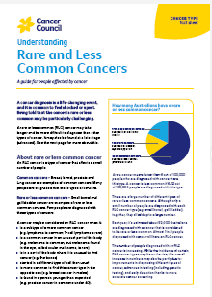- Home
- Rare or less common (RLC) cancers
- Coping with a diagnosis
Coping with a RLC cancer diagnosis
A cancer diagnosis usually brings uncertainty, but for people with an rare and less common (RLC) cancer, that uncertainty and feeling of isolation may be harder. You may also feel distress and a range of strong emotions, such as shock, disbelief, fear, anger, sadness and anxiety. Below are some ways that may help you manage how you are feeling.
Find out more informationNot knowing what to expect can be tough. There’s a lot you can’t predict or control – when you will get a confirmed diagnosis, what treatment you will have and how long it will take.It may help to find out as much information as you can. Ask your doctor questions as well as where you can find more reliable information. Make a list of things to ask at your appointments (see here and here). You may be able to email follow-up questions or talk to a cancer care coordinator or nurse. | |
Stay connectedIf you have to travel away from home for treatment, you may feel lonely without the usual support of your family, friends or community. Or people may not be able to visit you because you need to avoid infections. You may stop work, and miss your co-workers and usual routine. Use email, social media or a blog to stay in touch with family and friends. | |
Try complementary therapiesComplementary therapies, such as massage and meditation, are therapies used alongside conventional medical treatments. They may help people cope with symptoms or side effects and lower stress and anxiety. Talk to your doctor about any therapies you may want to use, to ensure they are safe.For more on this, see Complementary therapies. | |
Join a support groupTalking to people who have the same type of cancer can make you feel less alone. You can join the Cancer Council Online Community to connect with others in a similar situation. Call Cancer Council 13 11 20 to find a support group that suits you.Rare Cancers Australia runs support programs and a community for people diagnosed with a rare or less common cancer. Call 1800 257 600. | |
Get help with work and moneyCancer can be expensive and may mean that you cannot do your usual work. This can make you feel more stressed. If you need legal or financial advice, Cancer Council may be able to connect you with professionals who can help.For more on this, see Cancer and your finances and Cancer, work and you. | |
Talk about how you are feelingIt is natural to feel overwhelmed by the diagnosis. Your cancer team can be an important source of support. The social worker at the treatment centre or hospital can also help. It is important to let your doctors know how you are feeling. They can refer you to a counsellor, psychologist, psychiatrist or another health professional trained to help. They may also be able to put you in touch with other people who are going through similar treatment.For more on this, see Emotions and cancer. | |
Watch for feelings of sadnessIf you regularly feel sad, have trouble getting up in the morning or lose motivation to do what used to make you happy, you may be depressed. This is common for people who have cancer. Talk to your GP, as counselling or medication – even for a short time – may help. Some people can get a Medicare rebate for sessions with a psychologist.For information on depression and anxiety, call Beyond Blue on 1300 22 4636. For 24-hour crisis support, call Lifeline on 13 11 14. |
When the cancer is advanced
RLC cancer may be advanced when found, it may spread, or it may come back after treatment. There may still be treatments to remove the cancer or help control its growth. Advanced cancer usually cannot be cured, but may be controlled with palliative treatment. Treatment will depend on the cancer, how far it has spread, your general health, treatment goals or preferences, and quality of life.
For more on this, see Living with advanced cancer and listen to our podcast on advanced cancer.
It is common to worry about cancer returning, even if you’ve been told it is cured. You can listen to our podcast on Managing Fear.
Podcast: Coping with a Cancer Diagnosis
Listen to more of our podcast for people affected by cancer
More resources
Dr Damien Kee, Medical Oncologist, Austin Health and Peter MacCallum Cancer Centre, and Clinical Research Fellow, Walter and Eliza Hall Institute, VIC; Emeritus Professor Phyllis Butow, Psychologist, The University of Sydney, NSW; Alison Danis, Consumer; Dr Michelle Harrison, Medical Oncologist, Chris O’Brien Lifehouse, NSW; Jess Pike, Senior Social Worker, Westmead Hospital, NSW; Trish Taylor, Consumer; Lesley Woods, 13 11 20 Consultant, Cancer Council WA.
View the Cancer Council NSW editorial policy.

